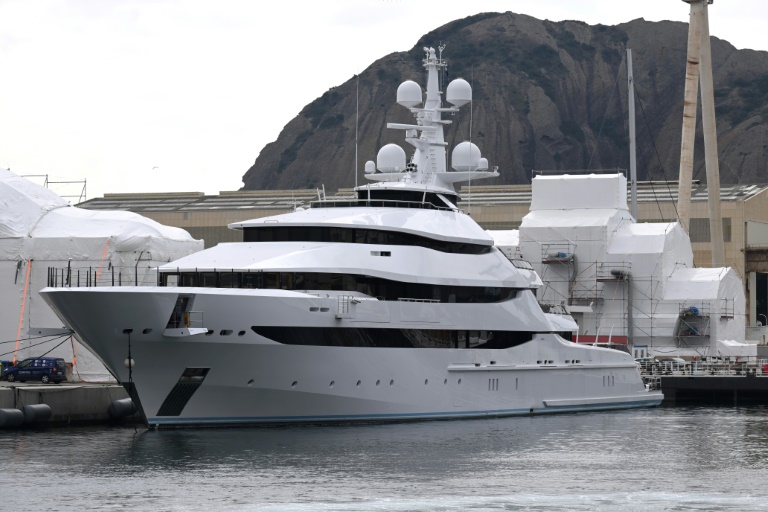Russian oligarchs’ superyachts on sanctions radar

The French government seized the Amore Vero, a superyacht owned by a company linked to Igor Sechin, chief of Russian energy giant Rosneft
London – Luxurious superyachts owned by Russian oligarchs reportedly close to the Kremlin have proved difficult to seize under Western sanctions imposed over Moscow’s war in Ukraine.
Russian President Vladimir Putin ordered the invasion one year ago, sparking a raft of economic penalties to punish his government and associates, both at home and abroad.
They included targeting the eye-catching and opulent marine status symbols of Russia’s elite that are still dotted around the world.
Experts say many of those yachts disappeared after the assault on Ukraine, before resurfacing in waters of countries that have not joined the unprecedented sanctions.
Former CIA agent and author Alex Finley has spearheaded an online hunt for Russian-registered mega-yachts under the Twitter hashtag #YachtWatch.
“People were very interested because… it really is a visual symbol of what was happening,” Finley told AFP.
“It became a little bit of a game, as the sanctions came and we started seeing the yachts disappear,” she said.
But such vessels are equipped with cutting-edge tracking systems that can be turned off only for safety reasons like piracy risks, meaning they can be traced online.
“The majority of them are in Turkey,” Finley said.
“A few of them have been spotted in the United Arab Emirates, so you have quite a few near Dubai. A few occasionally have shown up in the Maldives and in the Seychelles,” she added.
However, authorities have so far detained or seized only a handful of these opulent ships measuring up to 100 metres in length and featuring top-end facilities.
Too often they are floating in ports of countries that have not sanctioned Russia.
– Covering tracks –
Among the few ships seized is the superyacht Amore Vero, which is linked to the chief executive of Russian state oil giant Rosneft Igor Sechin.
The vast white vessel worth over 100 million euros, with a swimming pool that can be transformed into a helipad, was seized by French customs in the port of La Ciotat outside Marseille last March.
Industry newspaper SuperYacht Times confirmed other seizures including Amadea, a $300 million ship owned by oligarch Suleiman Kerimov and seized in May by authorities in Fiji on behalf of the United States. It has been impounded in San Diego, California.
Another big catch was Russian oligarch Viktor Vekselberg’s $90 million superyacht Tango in Mallorca, Spain, last April.
The US last month unveiled criminal charges against two men who it said sought to protect Vekselberg’s vessel from seizure.
And British authorities in March detained a Russian-owned $50 million superyacht, the Phi, docked at London’s Canary Wharf.
The situation is further complicated because many yachts avoid the Russian flag, while oligarchs often hide behind front companies to cover their tracks.
The Phi, for example, is registered to a company based in the Caribbean nation of Saint Kitts and Nevis and sails under a Maltese flag.
But Britain’s National Crime Agency anti-kleptocracy unit said its ultimate owner was a Russian businessman. The Financial Times reported last March that it belonged to Vitaly Vasilievich Kochetkov, a telecom oligarch.
– ‘Hypocrisy of oligarchs’ –
The Organized Crime and Corruption Reporting Project, a journalist consortium, recently claimed that according to leaked documents, Russian billionaire Roman Abramovich owned at least ten more yachts in addition to the six that are publicly known.
Abramovich has been hit with sanctions by Britain and the EU, though not the US, for his close ties to Putin.
And once a yacht is seized, authorities are left with the huge costs for maintaining them — sparking questions about who foots the bill.
“The rule of thumb for maintenance costs is about ten percent of the vessel’s value per year, but on some of the bigger yachts it can easily be more,” said Ralph Dazert, head of intelligence at SuperYacht Times.
“Keep in mind that this is not just about maintaining the yacht in working order, keeping it safe and compliant with regulations and looking nice, but the whole running cost of the yacht: so also crew, food and beverages, fuel (and) yacht management.”
For Finley, however, such expenses are the price to pay for penalising oligarchs who support Putin while enjoying the “benefits of democracy” elsewhere.
“As it became clear that Putin was going to invade, I started highlighting the Russian yachts that are here, just to point out this hypocrisy of the oligarchs,” she said.
“They support Putin in destabilising democracy, but at the same time they come here.”
